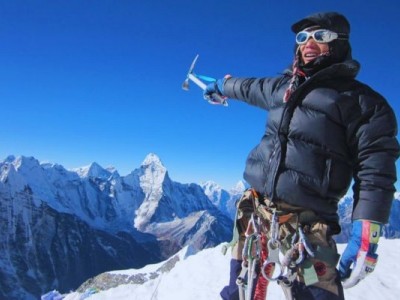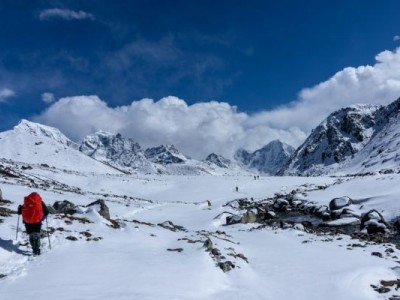The mythology behind the Tihar Festival
Tihar is observed to mark the celebration of virtue over sin. According to Hindu mythology, the festival came to light after a sister was able to save her brother’s soul from demons with her intellect. Legend holds that once a daughter got married and did not come home for a long time, then her worried parents sent their son to pay a visit to know her well-being. When the brother encountered a demon on the way, he persuaded the demon to devour him after visiting his sister.
Knowing this, the sister made a garland out of Makhamali (Globe Amaranth flower); put it around her brother's neck, and taught him to tell the demon to devour him when the Makhamali flower loses its colour. The demon agreed, but the flower by its nature maintained its hue throughout the ages which made the demon eventually perish from hunger.
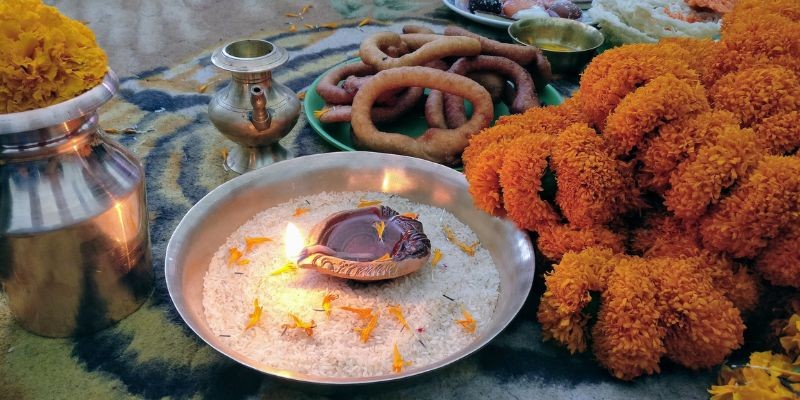
Significance of Tihar Festival
Tihar festival is very significant to Nepalese people in terms of both social and religious harmony.
It is an auspicious occasion for family reunions where they get to spend intimate time. Especially for the long-distance sisters who are married-, get to visit their homes after a long time during the occasion of Bhai Tika. ‘Deusi’ and ‘Bhailo’ are also remarkably celebrated in society. It is not just a great occasion for family reunions but also for relatives and society as a whole.
It does not just express reverence for humans and gods, but also for creatures like crows, cows, and dogs that share intimate relationships with humans.
How is Tihar Festival Celebrated?
Unlike the biggest festival, Dashain which is normally celebrated in one’s hometown, Tihar, the festival of lights, is celebrated where you are. By the time of Tihar, most people who went to their hometown during the Dashain will already be back in the city.
Animals such as crows, gods, and cows are revered and fed. People make colourful patterns of rangoli using materials such as coloured rice, coloured sand, and flower petals at the entrance to their homes and shops. On the last day, the sisters greet and bless the brothers. Children and youths in the society gather and play and dance along to the Deusi and Bhailo songs with immense joy.
As the sun goes down, you can see the festivities everywhere and the energy is electric. Everyone’s out, and the streets are alive with the music of Tihar pumping, firecrackers going off, and colourful lights everywhere! The cultural vibes are at their peak.
Day 1: Kaag Tihar- Crow Festival
Kaag Tihar marks the beginning of the Tihar Festival. On this day, the crow is revered and fed to thank them. Crows have been mentioned in the Hindu Scriptures as the messengers of Yamaraja, the god of death. It is believed that feeding and thanking the crows might help one avoid possible misfortune. Crows are fed by people leaving sweets and various grains outside or on the tops of buildings.
Day 2: Kukur Tihar- Dog Festival
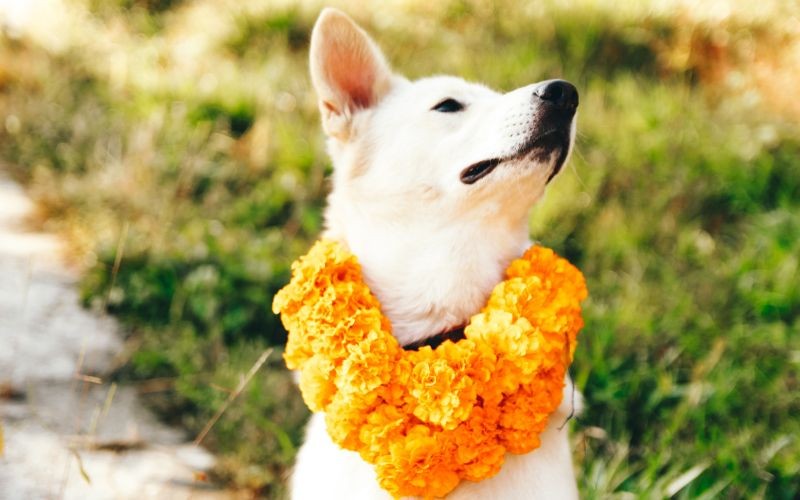
The Festival of Dogs, or Kukur Tihar, highlights dogs’ loyalty to humans. As today is a special day for the dogs, it’s more like a dog’s birthday! Most of the dogs you see will have a tika on their forehead with a garland around their neck. The main essence of the day of the Festival of Dogs is to convey the message that humans should show compassion and love to dogs, and feed them.
Dogs occupy a special place in Hindu mythology and keep an important role as gatekeepers of their owner. It is also celebrated to acknowledge the cherished relationship between humans and dogs.
Day 3: Gai Tihar- The worship of Cow and Goddess Lakshmi
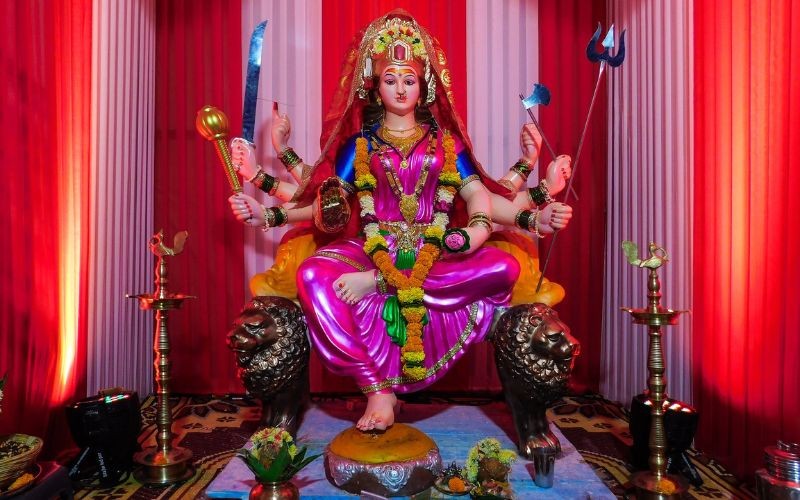
On the day of Gai Tihar, Cows, and the Goddess Lakshmi are worshipped. According to Hindu Scripture, cows are revered as the most sacred animal. The cow is also Nepal’s national animal.
Cows have become essential farm animals in Nepal over the country's long history of agriculture. Its milk is used to make curd, ghee, paneer, cheese, and other dairy products. Even cow urine is revered as sacred and beneficial to health. Its dung is used as a natural fertilizer and can even be burnt for heat after baking in the sun.
So, on the occasion of Gai Tihar, Hindus adorn cows with garlands on their head, apply tika to their bodies, and feed them with delicacies.
This is also the day of Laxmi, the goddess of wealth and prosperity. Every house and shop layout has amazing colourful rangoli patterns, fairy lights, and marigold garlands wrapped around the entrance. The trail of red mud is drawn for the god of wealth to follow and bring wealth into the shops and homes with them and fortunes in the year to come.
All the streets are lined with beautiful lamplights and fairy lights everywhere. One will be able to hear the music of the Tihar festival.
In the evening, a group of young girls performs Bhailo around neighbourhood homes. In exchange, homeowners give them moderate sums of cash and treats such as Sel roti. To be able to see people celebrate this festival is heartwarming.
During the night, people also light fireworks. Recently, though, this practice has been limited by the Nepal Government.
Day 4: Govardhan Puja/ Goru(Ox) Puja and Maha Puja
The fourth day of Tihar marks Ox Day when Hindus worship and treat oxen. Then and now, oxen are still used as a means of ploughing in agriculture. However, the introduction of modern tractors has replaced this in many parts of Nepal.
In the dawn, it is the turn of Young men to visit around their neighbourhood singing Deusi.
The fourth day of Tihar also marks the first day of the Nepal Sambat calendar. The Newars commemorate this day as Mha Puja, which in Newari means “worship of the self” or which means celebrating the spirit within oneself.
On this day, the Hindus also worship dung piled in the form of the Govardhan mountain.
Legend holds, that Lord Krishna uplifted Govardhan Hill to save the villagers from the heavy rain directed by Indra, the God of Rain. Govardhan Puja is therefore a celebration of the day Krishna rescued the villagers beneath Govardhan Hill.
Day 5: Bhai Tika- Worship of Brother
On this day, the sister will put a Makhamali garland of flowers around the brother’s head. The sisters perform prayer rituals with their brothers. Eventually, the brothers perform a similar ritual to their sisters.
It is observed by sisters applying rainbow colours tika to the foreheads of their brothers. This is to ensure long life and thank them for the protection they provide. In a similar way, the brother gives tika to their sisters in exchange for gifts.
Sisters make a special garland for their brothers from Makhamali, a flower symbolizing longevity. It is an occasion where the sisters who are married get to meet their brothers and siblings who have not met for a while. It is a wonderful occasion for family reunions while strengthening the close bonds between brothers and sisters.
So, would you rather Bhai Tika, Date, or Marry?
When is the Tihar Festival 2026?
Tihar 2026 begins on the 18th of October and lasts until the 4th of November
1. Kaag Tihar: November 6, 2026
2. Kukur Tihar: November 7, 2026
3. Laxmi Pooja: November 8, 2026
4. Gobardan Puja/ Maha Puja/ Gaigoru Puja: November 10, 2026
5. Bhai Tika: November 11, 2026
Tihar Festival in 2027
1. Kaag Tihar: October 27, 2026
2. Kukur Tihar: October 28, 2026
3. Laxmi Pooja: October 29, 2026
4. Gobardan Puja/ Maha Puja/ Gaigoru Puja: October 30, 2026
5. Bhai Tika: October 31, 2027
Travel During Tihar Festival
Unlike Dashain, which is typically celebrated in one's hometown, Tihar is celebrated wherever you are. As such, you are able to take part in the festivities in Kathmandu. As you walk the streets of Kathmandu, you can be totally immersed in the festivities. The cultural vibes are at their peak; there are lamps, sweets, and treats everywhere.
Trekking routes in the Annapurna Region such as the Annapurna Circuit Trek, and Mardi Himal Trek, Annapurna Base Camp Trek are especially rewarding during this season, with clear skies and a festive atmosphere enriching the entire experience.
Join us in the celebration of the Festival of Lights in Nepal. Be a part of it, enjoy, and celebrate! The music, the decorations, and the lights are out of this world and something you will never forget!



